Theology of History
 |
 |
 |
 |
 |
 |
 |
Egalitarianism - I
Two Families of Souls:
Egalitarian & Anti-Egalitarian
We thought it opportune to offer this course to Americans who are interested in finding out how deeply ingrained the egalitarian spirit is in our country. The reader will also recognize the prophetic spirit of Prof. Plinio, who forewarns in this series that the whole world is being subjected to a one universal revolution of customs and ways of being, dominated by spirit of Egalitarianism - The Editor
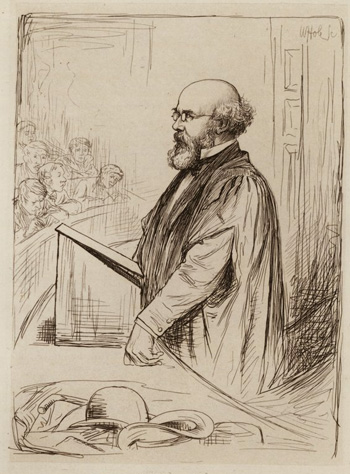
The formal & hierarchical professor seems dull & outdated to egalitarian students
On the contrary, there are students who like the authoritarian professor who establishes this difference between himself and the class. They are rare, but they do exist. My long experience as a professor shows me that students in general do not like authoritarian teachers, but when they get older and recall the time when they were students, they remember with special fondness the professors who knew how to maintain hierarchy and establish this difference. There is some part of the minds of these students, even the egalitarian ones, that pays homage to inequality. What was said here about the classroom can apply to almost every sphere of life.
The egalitarian priest
The egalitarian priest does not wear a hat because it is a more egalitarian and less bourgeois not to do so. He does not wear a tonsure in order to be more like other men. When he goes out, he takes advantage of every opportunity to wear a black shirt and trousers instead of the long cassock; he wears a wrist watch, smokes in public, and has a clever way of striking the match to light his cigarette.

A ‘hip’ egalitarian priest practices a drill with the cheerleaders
This type of priest is an egalitarian priest. He jokes with the altar boys as the sacristan brother does. He treats the Marian congregation with great familiarity, and he likes its members to treat him that way. He follows things on the radio, he hums the latest songs, etc. He is an egalitarian man.
Thus everything that could suggest the preeminence of the priest is done away with, or at least diluted to put him on the same level as the others.
Two families of souls
Regarding Catholics and their attitude towards priests, there are two families of spirit that differ greatly.
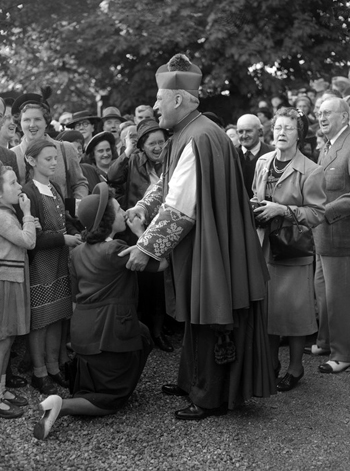
A woman enjoys showing respect to Rev. Cushing in Boston, 1949
“Yes, of course! He is a very good priest. He prays with great recollection, he is an excellent catechist, and he gave an incomparable sermon on Our Lady. He inspires respect and trust, and is a real pillar for us. His counsel resolves any problem. He is a good priest, a real one!”
Another may describe a different priest in this way: “Now he is a real priest. He’s funny and we can enjoy a good laugh with him. He’s a regular fellow, a comrade! He does not have those old prejudices.
“He is always happy, always laughing, and never says anything to upset anyone. He isn’t always running after people to give them advice or speaking about religion. His presence attracts people. When you see a priest like that, you realized that there are up-to-date people in the priesthood.”
Then he concludes: “I like men like that.”
The latter man belongs to a family of souls that likes to see the priest as equal to himself. The other family of souls sees the priest as a superior.

Archbishop Duarte Leopoldo e Silva of São Paulo, formal & dignified, aware of his high office
Dom Duarte was a very thin, formal man with a fixed gaze, well-combed hair and a lordly manner in his whole way of being. Many times Dom Duarte would leave the church and people would approach him and kiss his hand.
Some were ecstatic with his superiority, they kissed his ring with great content, happy to pay him this homage. He would say a few words to them and they would leave, taking those words home as a kind of sacramental.
Others would approach because the Archbishop was passing by, but they did so with the stupid fear of someone who, deep down, is angry. It is not a real fear, but a fear that comes from envy, anger and a sense suppression. They kissed his hand, but unwillingly, because there was no way out. And they left filled with anger.
These are the two families of souls, clearly characterized.
Facing the problem of inequality
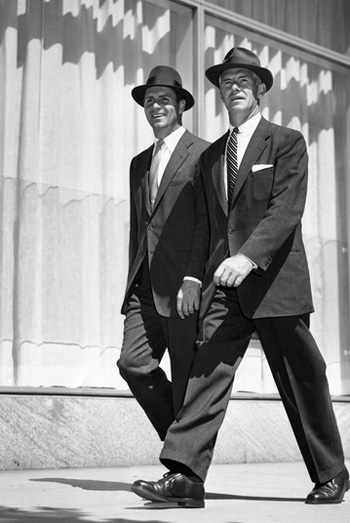
Businessmen of the past present themselves as men to be respected & admired
1. There are certain persons who, when they introduce themselves, show that they value themselves and seek the respect of others. Thus they adopt an attitude in which they make their superior qualities shine through.
2. On the contrary, there are persons who do not value themselves and who walk down the street with a pseudo-naturality. They have the good-natured, smiling air of someone who thinks everything is good, and treats everyone in an unintelligent spontaneous way. This is another family of souls.
These two families of souls establish the matter at hand: One clearly likes equality and the other clearly likes inequality.
The essential problem is to verify the importance of this question of inequality in the structuring of the human soul and a man’s conceptions of life, and to see how profoundly this matter marks the man. With this we can come to better understand the problem of equality and inequality.
Defending the spirit of hierarchy
It is entirely evident that we do not need an apology [explanation in defense] for the spirit of hierarchy. It would be ridiculous to attempt make one in this particular audience [of counter-revolutionaries]. What unites and brings us together here is the love of hierarchy – of all the true, legitimate hierarchies possible among mankind. Not only those that exist and whose survival we desire, but also those that have existed and whose disappearance we lament, and those that will exist and whose birth we already await with joy.
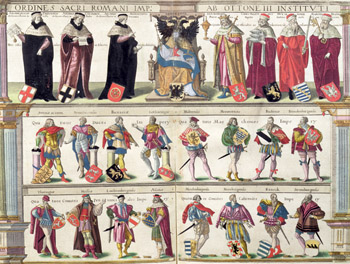
A counter-revolutionary spirit admires & studies the hierarchy of the past; above, the social order under Emperor Otto III, 10th century
We must, therefore, know all the appropriate arguments through which this doctrine is distilled: First, because every formation is based on this. Second, because for those like us who fight for ideas, there is no more precious means of combat than arguments.
For the man who fights for ideas, the argument is as important as the weapon is for the soldier.
St. Thomas & King St. Louis IX
St. Thomas once went to dinner with St. Louis. At a certain point during the conversation, his gaze became abstract and he began to think about something other than the subject being discussed. Suddenly, he, a corpulent man, banged his fist on the table and called out triumphantly: “Ergo concluso contra manicheus” (This resolves the matter against the Manicheans). He had the argument to defeat the Manicheans.
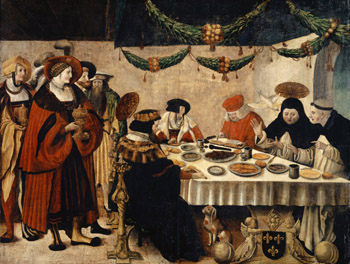
St. Thomas Aquinas inspired by the Holy Spirit in an argument against the Manicheans
Why did these persons give so much importance to a new argument? Because they understood that this new argument was a new definitive weapon. This is the value of an argument at a time when ideas, logic and arguments truly have power.
Knowing arguments is a central concern of life
Therefore, for we who are counter-revolutionaries and dedicate our entire lives to defending certain ideas, to know the arguments upon which these ideas are based and discover a new argument to justify these ideas is one of our central concerns. It is not to convince ourselves, but to know how to fight.

A serious man finds joy in discovering arguments to support his thinking
The raw material of an ideological war is ideas and arguments. One who wants to do something without ideas and arguments is like a man who wants to be an admiral and takes all the necessary steps except for going out on the ocean and actually learning how to handle and captain the ship. Whoever wants to make our apostolate without the concern to know our doctrine and to learn how to argue well is deceiving himself.
Why are we anti-egalitarian?
Therefore, it is not the case to address this topic by asking whether we should be egalitarian or anti-egalitarian. The question, rather is first to know clearly why I am anti-egalitarian. I already know that I take this position. But why? Second, to knowhow to prove to others that egalitarianism exists, that it is evil, the extent of its scope, etc.
This, then, is what we will address in this series of lectures on Egalitarianism.
Continued
Posted September 24, 2025

______________________
______________________





